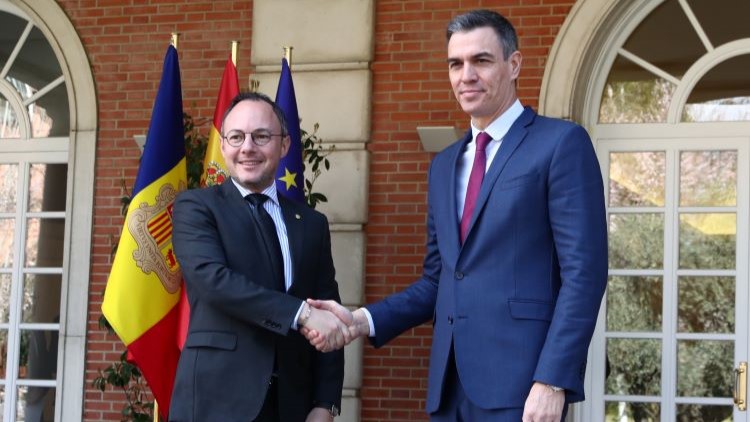Eduardo González
The Equatoguinean opposition in exile has celebrated the decision of the National Court to order the arrest of a son of President Teodoro Obiang Nguema and two members of his Government investigated for the alleged kidnapping of four opponents, two of them of Spanish nationality.
On February 22, the Criminal Chamber of the National Court ordered Judge Santiago Pedraz to issue national and international arrest warrants against the head of the Foreign Security Service, Carmelo Ovono Obiang (one of the president Obiang’s thirty children), and two other senior security officials, the Minister of State for Internal Security, Nicolás Obama Nchama, and the general director of Presidential Security, Isaac Ngema Endo, who are being investigated “for the disappearance of four opponents of the regime of That country”.
In its order, the Second Section has upheld the appeal presented by the Movement for the Liberation of Equatorial Guinea-Third Republic (MLGE3R), to which the families of the victims joined, against the resolution of Pedraz himself in which he denied the orders of detention. In the opinion of the court, the judge’s decision “denying the arrest warrants does not offer any reason that justifies in a reasoned manner the reason why it was rejected.”
Pedraz had decided to cede jurisdiction over the alleged kidnapping of the four opponents to Equatorial Guinea, considering that “there is no basis” to conclude that the criminal activity had been committed “at least partially” in Spain, after receiving a rogatory commission from the authorities of Equatorial Guinea for the transfer of jurisdiction over this case to the Supreme Court of Justice of that country. In the judge’s opinion, there were no reasons to doubt “that a process is not followed with the due guarantees recognized by International Law” in Equatorial Guinea.
As a consequence of the Court’s decision, Judge Francisco de Jorge, replacing Santiago Pedraz, issued European and international arrest warrants and imprisonment against the defendants last Friday.
In response to this decision, the Equatoguinean opposition in exile – formed by the Citizens for Innovation (CI), Popular Union (UP) and Progress Party (PP) parties – issued a statement this Monday in which it showed its “enormous satisfaction at seeing the expectations of justice partially met in the case of the kidnapping in Juba of two Spaniards, Feliciano Efa Mangue and Julio Obama Mefuman, and two Guineans Martín Obiang Ondo Mbasogo and Bienvenido Ndong Ondo.”
“As we know, one of the kidnapped people, Julio Obama Mefuman, died from mistreatment in the Oveng Azem prison and his body has not been expatriated to Spain, as demanded by the judge, the family and the European Parliament. Of the other three, the Spanish consular authorities in Guinea have not had any access to them for at least three years, despite requests made on several occasions by the Spanish Embassy in Malabo to visit them and thus provide the necessary consular assistance, as contemplated by International Law,” the statement continues.
In the opinion of the three opposition parties, Pedraz’s decision was “clearly anomalous” and “systematically and openly favored the defendants, who are members of the government of Equatorial Guinea, the second worst dictatorship in the world after North Korea”.
The case
The National Court had opened an investigation against Carmelo Ovono Obiang (who has strong ties to Spain, since he has resided in Marbella since 2020 and is married to a Spanish woman) and the other two senior security officials for their alleged involvement in the kidnapping and the torture against four members of the MLGE3R in November 2019.
As a consequence of this investigation, the vice president of Equatorial Guinea, Teodoro Obiang Nguema Mangue (also the son of the president), accused Spain in early 2023 of “interference, humiliation and lack of respect for sovereignty.” In response to these accusations, the Ministry of Foreign Affairs reminded Malabo that in Spain there is “separation of powers.”
The four kidnapped opponents are Feliciano Efa Mangue, Julio Obama Mefuman (both with Spanish nationality), Martín Obiang Ondo Mbasogo and Bienvenido Ndong Ondo (long-term residents and under protection in our country), who, according to the accusation, had been convinced with tricks so that they would travel from Madrid to Juba (South Sudan), where they were kidnapped and disappeared on November 15, 2019.
The opponents were sentenced in March 2020 by a military court to sentences of between 60 and 90 years in prison for an alleged coup d’état. Julio Obama Mefuman, former corporal in the Spanish Army and sentenced to 90 years, died in mid-January 2023 at the Bata hospital. His party claimed that he had died due to torture, while the Malabo regime was quick to announce that he had died “of illness.” At that time, the Ministry of Foreign Affairs summoned the ambassador of Equatorial Guinea to ask for explanations and request a pardon for Feliciano Efa Mangue. A month later, the European Parliament blamed the “Equatoguinean dictatorial regime” for the death of Julio Obama Mefuman.







